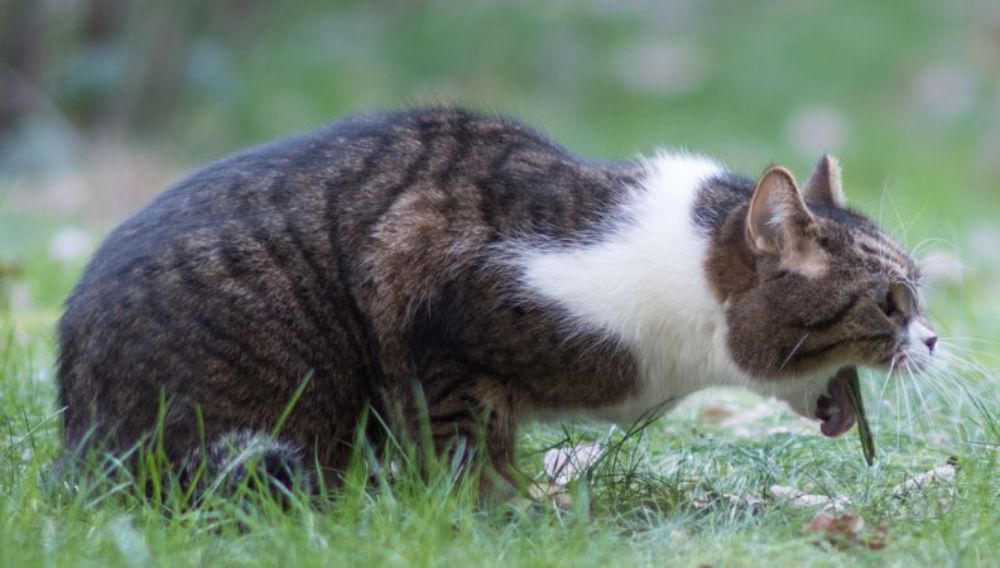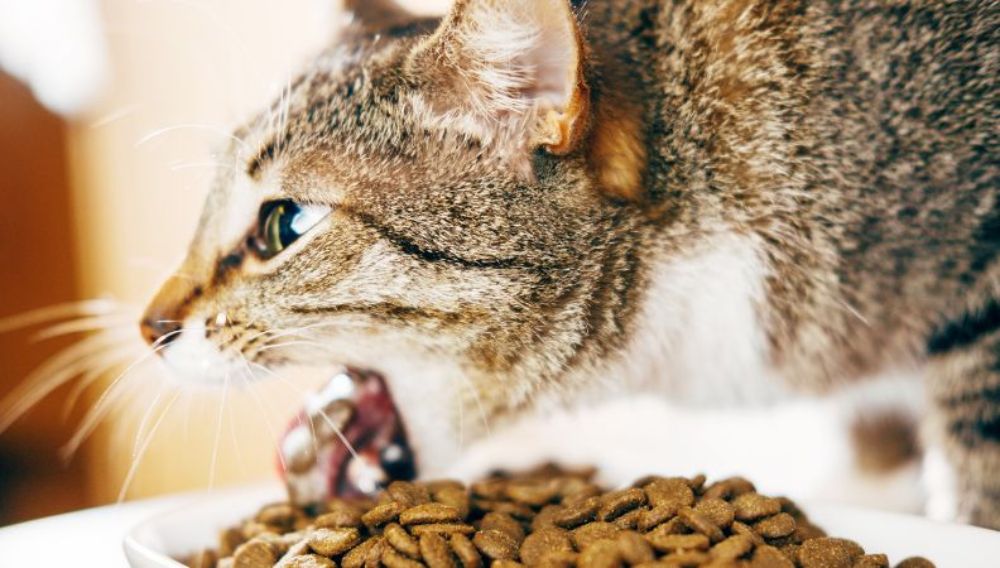Vomiting is very common in cats and can be caused by a wide range of conditions. In most cases, it’ll resolve without treatment and before a cause has been identified. If you’re concerned about your cat, talk to your vet. Try to give exact details so that your vet can decide if further investigation and treatment is needed.
So you can be prepared and understand if it's a one-off, a hairball or if a trip to the vets is needed, our guide has the information you need about your cat's vomit.

Why do Cats Vomit?
Vomiting is the body’s way of protecting itself from toxic substances entering the body. The stomach muscles contract so that the contents can be vomited out of the mouth. A cat may swallow lots or salivate just before it’s sick.
Vomiting, retching and regurgitation are very different. Retching is where little or no vomit is produced. Regurgitation happens after a meal and the vomit will have lumps of undigested food in it, also, your cat is likely to eat the regurgitated food! Vomit may be liquid and have mucous food, or blood in it.
If there’s food in the vomit this means the cat was sick before the food was digested, or the food caused the vomiting. An intestinal obstruction could also be the cause. Liquid vomit means the cat has had an empty stomach, so the vomiting is unlikely to be because of something they ate.
The colour of the vomit can provide clues to the possible cause - more below on vomit colour!
Why is My Cat Vomiting?
An intestinal, abdominal, stomach or metabolic problem could be the cause of your cat vomiting. It could be a neurological condition, the side effects of drugs or a toxic substance. Cats can be poisoned by human medications, like paracetamol, so they should never be given to them or left in reach of your cat. There are lots of possible causes that your vet will need to investigate.
If it’s a tummy problem, it could be caused by conditions like gastritis, foreign bodies, cancer, ulcers, parasites, bacterial and viral infections. There’s also the possibility of intestinal obstruction, colitis, pancreatitis, endocrine disease, and toxins. Motion sickness could be the cause if your cat has been for a ride in the car recently.
Vomit Colour Guide and Types of Cat Sick
There are many colours and types of cat vomit which can help your vet to work out what the cause is (see cat vomit colour chart below). In most cases, it’s best to get your cat checked by a vet as they may need prompt treatment.

- White foam vomiting may look concerning but is caused by air being pushed through the mouth when the cat is being sick.

- Brown cat vomit could be caused by what your cat eats, but it could also be caused by bleeding in the intestinal tract.

- Green cat vomit can be due to consumption of plant material (grass or plants) but can also be due to vomiting bile. If you’ve noticed your cat nibbling plants, check they’re not poisonous.

- If your cat vomits yellow, this is an indicator of bile which means your cat Is being sick on an empty stomach. Bile is produced by the liver to aid digestion. If there is blood in the vomit, this can indicate bleeding in the digestive tract. Your cat will need to be seen by a vet.

- Black cat vomit that looks like coffee granules, is an indicator of digested blood and needs investigating.

Cat hairball vomit can look concerning, but if the contents look mainly like cat hair, then there’s nothing to worry about, it's a cat hairball. As gross as they may be, vomit hairballs are normal from your cat's self-grooming.

When to Worry about Your Cat Vomiting
Vomiting isn’t often a cause for concern and will clear up without treatment. Some cats may only vomit once and are back to normal quickly. Fasting your cat for 24 hours, followed by a bland diet of cooked white fish or chicken, usually does the trick. Make sure your cat always has access to fresh water as they could become dehydrated, especially if they’ve got diarrhoea too.
Chronic vomiting that lasts longer than 1 or 2 days, distress and weight loss could be signs of illness and will need veterinary treatment. Medical conditions with symptoms of vomiting include heatstroke, inflammatory bowel disease, kidney disease or liver disease.
Blood vomiting in cats is usually a sign of problems within the digestive tract. Vomiting after eating is a common symptom of hyperthyroidism (an overactive thyroid gland). Cats with food allergies also suffer with vomiting and/or diarrhoea, in addition to skin symptoms.
If the vomiting continues for longer than a day, or you’re concerned by its colour call your vet. Kittens can deteriorate quicker than adults so may need veterinary attention sooner.
What to do if Your Cat's Sick
In most cases, a vomiting cat can be treated at home by fasting them for 24 hours. When the vomiting has stabilised, you can allow your cat to drink small amounts of water. When they’ve stopped vomiting, bland food like cooked white fish or chicken can be given as they're easily digested. Don’t give your cat milk to drink.
If you feel you need to take your cat to the vet, they’ll ask you questions like…
- When did the vomiting begin?
- What colour is the vomit?
- What has your cat eaten?
- Is your cat vomiting after eating?
- Are other pets in the household affected?
- Have they received any medical treatment recently?
- Does your cat go outside, hunt or scavenge?
- Have they been exposed to any poisons?
Try to have the answers to these questions ready so your vet can find out the cause and give your cat the specific treatment they need quickly.
If your cat is dehydrated, they may need fluid therapy and replacement electrolytes. The vet can treat your cat with anti-sickness medication if they've been vomiting for long periods.
To help find the cause of the vomiting, your vet may need to take samples of vomit, urine, and blood. An X-ray and/or endoscopic examination may be needed if the vet suspects a foreign body or obstruction. If one is found it will need removing surgically. A small sample of intestinal tissue may also be taken.
There are many causes of an upset stomach that can lead to cats vomiting. In most cases, cats get better in a day or two. If your cat frequently vomits or has developed other problems, make an appointment with your vet. Check the colour of your cat’s vomit to help decide if your cat needs to be seen for treatment.
Everypaw Cat Insurance
Everypaw's Cat Insurance comes with 24/7 unlimited access to vets and vet nurses that can help with your pet's health, care, nutrition and behaviour. So you can rest assured your kitty will be well looked after.
Content reviewed and updated by Vetstream - www.vetstream.com/treat/felis
Vetlexicon is the world’s largest peer-reviewed online clinical reference source. All our content is written and peer-reviewed by over 1,000 of the world’s leading veterinarians, ensuring relevance, accuracy and quality.
- Phil Nicholls, Ed Hall, Kenneth Simpson (online) Vomiting. In: Vetlexicon Felis. Vetstream Ltd, UK. Website: https://www.vetlexicon.com/treat/felis/diseases/vomiting
- Vetstream Ltd (online) Vomiting and diarrhea Client Information. In: Vetlexicon Felis. Vetstream Ltd, UK. Website: https://www.vetlexicon.com/treat/felis/client-information/vomiting-and-diarrhea